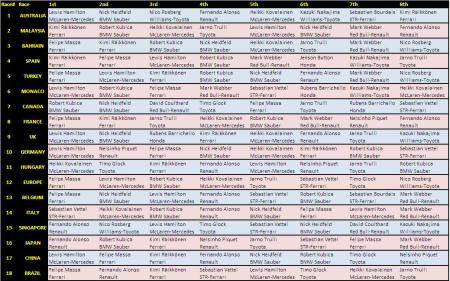This is a sequel of my earlier post on F1 Points System – The True Story.
On 26 November 2008, FIA boss Bernie Eccelstone told in a news conference (click here to watch the video) that he intends to introduce a new points system in F1 racing to ensure the driver with most wins is crowned the champion. Gold, silver and bronze medals would be given to the top three finishers. The driver with most gold medals won will be crowned, and in case of similar tally, the decision will be made on the bases of count of the next medal in line.The system still requires approval from F1’s governing body, the FIA, Its world council – the body that would decide whether to introduce the system – meets next month.
The current system awards points (10, 8, 6, 5, 4, 3, 2, 1) to the top 8 finishers in a race, and its difficult to see how Bernie would convince the FIA and the minnows in the F1 world to agree on the new system, one which ensures the teams finishing outside the top 3 would remain empty handed. The FIA also awards money for each point earned, and hence how the classification (standings) will decide the prize money will also have to be confirmed.
The points system has been criticised not just this year, but even in 2003, the world title went down to the last race between Ferrari’s Michael Schumacher and McLaren’s Kimi Raikkonen even though the German had won six races to the Finn’s one.



 Posted by perspace
Posted by perspace 

